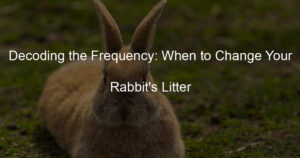
Introduction to Lionhead Rabbit Diet
When it comes to caring for your Lionhead rabbit, diet plays a crucial role. A balanced and nutritious diet is the key to a healthy, happy rabbit. In this section, we will delve into the importance of a balanced diet and clear up some common misconceptions about bunny food selection.
- Understanding the Importance of a Balanced Diet
Just like humans, rabbits need a balanced diet to stay healthy. A balanced diet for a Lionhead rabbit includes hay, vegetables, pellets, and a small amount of fruit. Hay should make up the majority of their diet as it helps keep their teeth in good condition and their digestive system working properly. Vegetables provide essential vitamins and minerals, while pellets are a concentrated source of nutrients. Fruits should be given sparingly as treats due to their high sugar content.
Feeding your Lionhead rabbit a balanced diet ensures they get all the nutrients they need for growth, development, and maintenance of good health. It also helps prevent obesity, dental problems, and digestive disorders, which are common health issues in rabbits.
- Common Misconceptions about Bunny Food Selection
There are many misconceptions about what rabbits should eat. One common misconception is that rabbits should eat lots of carrots. While carrots are not harmful to rabbits, they should be given in moderation due to their high sugar content. Too many carrots can lead to obesity and other health problems.
Another misconception is that rabbits can eat any type of vegetable. However, some vegetables like iceberg lettuce and potatoes can be harmful to rabbits. It’s important to research and consult with a vet before introducing new foods into your rabbit’s diet.
Lastly, many people believe that rabbits only eat plants. While it’s true that the majority of a rabbit’s diet should be plant-based, they also need a small amount of high-quality rabbit pellets for essential nutrients that plants alone can’t provide.
In conclusion, understanding the dietary needs of your Lionhead rabbit and dispelling common misconceptions about their food selection is key to ensuring their health and longevity.
Bunny Basics: Understanding Rabbit Nutrition
Feeding your Lionhead rabbit the right diet is crucial for its health and well-being. Understanding the basics of rabbit nutrition can help you make informed decisions about what to feed your furry friend. Let’s delve into the essential nutrients that your Lionhead rabbit needs.
Essential Nutrients for a Lionhead Rabbit
Just like humans, rabbits need a balanced diet to stay healthy. For a Lionhead rabbit, this includes fiber, protein, and vitamins and minerals. Let’s explore each of these in detail.
- Importance of fiber
- Role of protein
- Vitamins and minerals
Fiber is the most important part of a rabbit’s diet. It helps keep their digestive system healthy and prevents issues like obesity and dental disease. A diet high in fiber can also help your rabbit feel full, preventing overeating. Hay is a great source of fiber for rabbits, and should make up about 70% of their diet.
Protein is another essential nutrient for your Lionhead rabbit. It helps them grow and repair their bodies. While rabbits don’t need as much protein as fiber, it’s still an important part of their diet. Good sources of protein for rabbits include leafy greens and commercial rabbit pellets.
Vitamins and minerals are also important for your rabbit’s health. They help support various bodily functions, like bone health and immune function. Most rabbits can get the vitamins and minerals they need from a balanced diet, but some may need supplements. Always consult with a vet before adding any supplements to your rabbit’s diet.
| Nutrient | Importance | Sources |
|---|---|---|
| Fiber | Supports digestive health, prevents obesity and dental disease | Hay |
| Protein | Supports growth and body repair | Leafy greens, commercial rabbit pellets |
| Vitamins and Minerals | Supports bone health, immune function | Varies, consult with a vet for specific needs |
Remember, every rabbit is unique and may have different nutritional needs. Always consult with a vet to ensure your rabbit is getting the right nutrients in the right amounts.
Choosing the Best Food for Your Lionhead Rabbit
Feeding your Lionhead rabbit the right diet is crucial for its health and longevity. The best food for your rabbit should be a blend of commercial rabbit food, fresh fruits, and vegetables. In this section, we will focus on how to choose the best commercial rabbit food for your Lionhead rabbit.
Commercial Rabbit Food Guide
Commercial rabbit food is readily available and provides a balanced diet for your rabbit. However, not all commercial foods are created equal. Here are some tips to help you make the right choice:
- Reading and understanding food labels: Always read the food labels before purchasing any rabbit food. The first ingredient listed should be hay or grass, as this is the main component of a rabbit’s diet. Avoid foods that list corn, seeds, or nuts as these can be harmful to your rabbit. Look for a high fiber content (18-22%) and low fat (1-2%).
- Top recommended brands for Lionhead Rabbits: Some of the top recommended brands for Lionhead rabbits include Oxbow Essentials, Burgess Excel, and Kaytee Timothy Complete. These brands offer high-quality, nutritionally balanced food that is suitable for Lionhead rabbits. Remember, the best food for your rabbit will depend on its individual needs, so it’s always a good idea to consult with your vet.
Choosing the right commercial food for your Lionhead rabbit is the first step towards ensuring a balanced diet. In the next section, we will discuss how to supplement this diet with fresh foods.
Supplementing with Fresh Foods
While commercial rabbit food is essential for your Lionhead rabbit’s diet, fresh foods play a crucial role too. They provide variety and essential nutrients that keep your bunny healthy and happy. Let’s explore the safe fruits and vegetables for your rabbit and understand how often and how much to feed them.
- Safe fruits and vegetables for your rabbit
- How often and how much to feed
Not all fruits and vegetables are safe for your rabbit. Some safe options include apples (without seeds), bananas, blueberries, broccoli, and carrots. Remember, while fruits are safe, they contain sugar and should be given in moderation. Always introduce new foods slowly to avoid upsetting your rabbit’s digestive system.
It’s important to balance the amount and frequency of fresh food you give your rabbit. As a general rule, a handful of safe vegetables can be given daily. Fruits, however, should be treated as treats and given sparingly – no more than two tablespoons per day for a 6-pound rabbit. Always remember, the bulk of your rabbit’s diet should be hay, supplemented with a small amount of pellets and fresh foods.
Supplementing your rabbit’s diet with fresh foods not only adds variety but also provides essential vitamins and minerals. However, it’s crucial to introduce these foods gradually and monitor your rabbit for any changes in behavior or digestion. When in doubt, consult your vet.
Healthy Rabbit Treats: What, When, and How Much
When it comes to feeding your Lionhead rabbit, it’s not just about the main meals. Treats play a significant role too. But what kind of treats are best for your bunny? And how often should they be given? Let’s find out!
Choosing Rabbit Treats
Choosing the right treats for your rabbit is crucial. Not all treats are created equal, and some can even be harmful to your pet. Here are some tips to help you make the right choice:
- Identifying Safe and Healthy Treats
- Avoiding Harmful Treats
Safe and healthy treats for rabbits often come from natural sources. Fresh fruits and vegetables are excellent choices. Apples, pears, and carrots are some of the favorites among rabbits. However, remember to remove any seeds from the fruits as they can be harmful. Also, always wash the fruits and vegetables thoroughly before giving them to your rabbit.
Not all foods are safe for rabbits. Foods like onions, garlic, and chocolate can be toxic to them. Also, avoid giving your rabbit any treats that contain a lot of sugar or artificial additives. These can lead to health problems like obesity and digestive issues.
Remember, treats should only make up a small part of your rabbit’s diet. The majority of their diet should consist of hay, which provides the necessary fiber for their digestive system.
Choosing the right treats for your rabbit can be a fun and rewarding experience. It allows you to bond with your pet while also ensuring they’re getting a balanced and nutritious diet. So, take the time to choose wisely, and your rabbit will thank you!
Feeding Treats to Your Lionhead Rabbit
Providing treats to your Lionhead rabbit can be a delightful experience for both you and your furry friend. However, it’s essential to understand the frequency and portion sizes for these treats to ensure your rabbit’s health and happiness. Let’s delve into these aspects.
- How often to give treats
- Portion sizes for treats
While treats can be a fun way to interact with your Lionhead rabbit, they should not make up a large part of their diet. Treats should be given sparingly, ideally no more than once or twice a week. This frequency ensures that your rabbit still gets the majority of its nutrition from its primary diet, which should consist of hay, pellets, and fresh vegetables.
When it comes to portion sizes, less is more. A good rule of thumb is to limit treats to the size of your rabbit’s ear or smaller. This size is small enough to not interfere with their regular meals but still large enough for them to enjoy. Remember, too many treats can lead to obesity and other health issues in rabbits.
In conclusion, while treats can be a fun addition to your Lionhead rabbit’s diet, they should be given sparingly and in small portions. This approach ensures your rabbit maintains a balanced diet and stays healthy and happy.
| Treat Guidelines |
|---|
| Frequency: Once or twice a week |
| Portion Size: Size of rabbit’s ear or smaller |
Lionhead Rabbit Care: Beyond the Diet
While a balanced diet is essential for your Lionhead Rabbit, there’s more to their care. Exercise and play are equally important aspects of their well-being. Let’s explore these in detail.
Exercise and Play for Your Lionhead Rabbit
Just like humans, Lionhead Rabbits need regular exercise and play to stay healthy and happy. Let’s delve into why physical activity is important and some fun, safe play ideas for your furry friend.
- Importance of physical activity
- Fun and safe play ideas
- Tunnel and Maze Games: Rabbits love to explore. You can create a safe maze or tunnel using cardboard boxes. They’ll enjoy running through it!
- Chew Toys: Chewing is a natural behavior for rabbits. Providing chew toys can help keep their teeth healthy while also giving them something to do.
- Ball Games: Soft, lightweight balls can be a fun toy for your rabbit. They’ll enjoy pushing it around with their nose.
Physical activity is crucial for your Lionhead Rabbit’s health. It helps keep their weight in check, improves their cardiovascular health, and strengthens their muscles. Plus, it’s a great way for them to burn off energy and reduce stress. According to a study, rabbits that get regular exercise are less likely to develop health problems like obesity and heart disease.
There are many ways you can encourage your Lionhead Rabbit to exercise and play. Here are a few ideas:
Remember, every rabbit is unique. What one rabbit enjoys, another might not. It’s important to try different activities and see what your Lionhead Rabbit likes best. The key is to ensure they’re getting enough exercise while having fun.
Regular Health Check-ups
Just like us humans, our furry friends, the Lionhead Rabbits, also need regular health check-ups. These visits to the vet are crucial to ensure that your bunny is in the best of health. Let’s take a look at what these check-ups usually involve and some common health issues that Lionhead Rabbits may face.
- What to expect during a vet visit
- Common health issues in Lionhead Rabbits
Your Lionhead Rabbit’s vet visit will typically start with a general physical examination. The vet will check your rabbit’s weight, teeth, ears, and fur for any signs of illness. They will also listen to your rabbit’s heart and lungs to ensure they are functioning correctly.
Next, your vet may perform a fecal examination to check for parasites. If your rabbit is older, the vet might also recommend blood tests to monitor organ function. Remember, these tests are not to scare you, but to ensure your bunny is healthy and happy.
Lionhead Rabbits, like all breeds, can be prone to certain health issues. Here are a few common ones:
| Health Issue | Description |
|---|---|
| Dental Problems | Rabbits’ teeth grow continuously throughout their lives. If not properly managed, this can lead to serious dental problems. |
| Obesity | Like humans, rabbits can also become overweight if they eat too much or don’t get enough exercise. This can lead to a host of other health issues. |
| Respiratory Infections | Rabbits can be prone to respiratory infections, which can be serious if not treated promptly. |
Regular vet visits can help catch these issues early, making them easier to treat. Remember, a healthy rabbit is a happy rabbit!
Conclusion: Bunny Diet Tips for a Happy, Healthy Lionhead Rabbit
In this article, we’ve learned a lot about the dietary needs of a Lionhead Rabbit. Let’s recap and provide some final tips to ensure your bunny stays happy and healthy.
- Recap of Lionhead Rabbit nutrition essentials
- Final tips for maintaining a balanced diet
Lionhead Rabbits require a balanced diet that includes hay, pellets, vegetables, and water. Hay should make up the majority of their diet, as it helps with digestion and dental health. Pellets provide essential nutrients, while vegetables add variety and additional vitamins. Water is crucial for hydration and overall health.
Always ensure that your rabbit has access to fresh hay and water. When introducing new foods, do it gradually to avoid upsetting their stomach. Treats should be given sparingly, and remember to avoid foods that are harmful to rabbits such as chocolate, avocado, and iceberg lettuce. Regularly monitor your rabbit’s weight and adjust their diet as needed to prevent obesity.
By following these guidelines, you can ensure that your Lionhead Rabbit enjoys a balanced diet that contributes to their overall health and happiness. Remember, a healthy bunny is a happy bunny!




